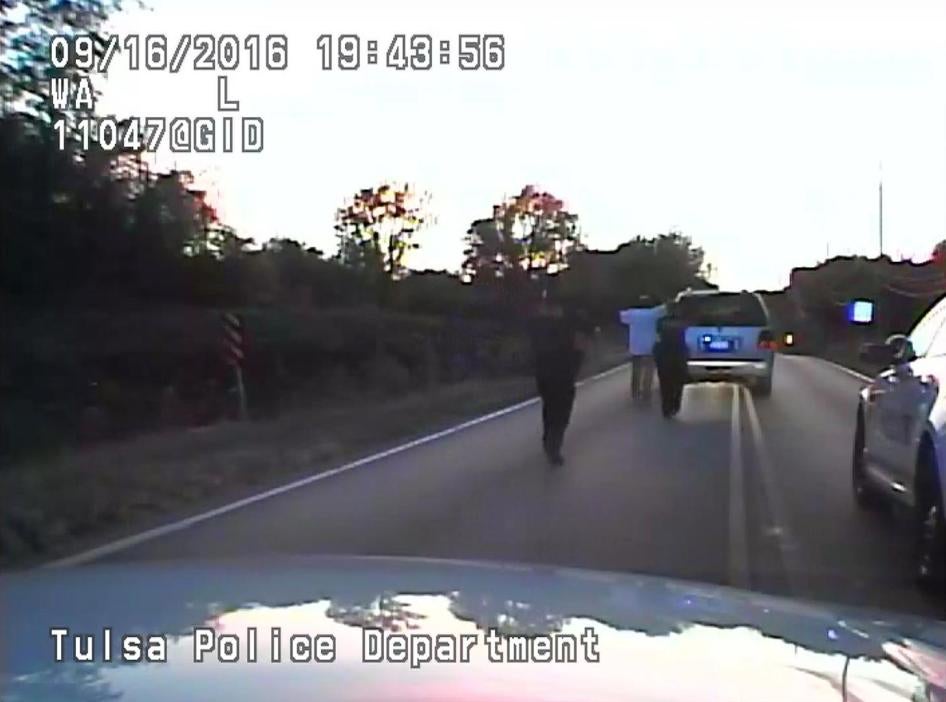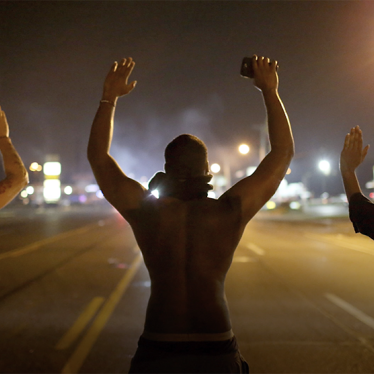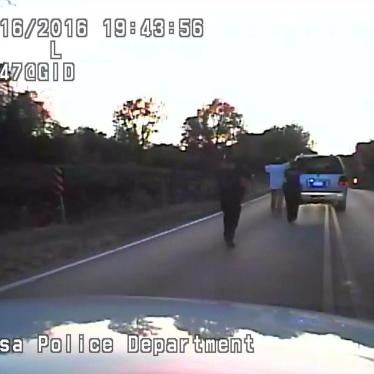- Tulsa has opened a city jail that houses people arrested for low-level municipal violations. According to administration sources, people booked into this jail are not turned over to ICE for detention and potential deportation.
- Tulsa Police could modify the policy of identifying undocumented people and reporting them to the sheriff’s department.
- Tulsa Police could expand the use of citations instead of arrests so that people are not taken to jail as frequently and are not exposed to ICE.
- Tulsa County could terminate its 287(g) contract with the federal government and discontinue programs involving enforcing immigration laws.
|
Fact Sheet
Policing and Latino Immigrants
Summary of Findings from HRW’s Report, “‘Get on the Ground!’: Policing, Poverty, and Racial Inequality in Tulsa, Oklahoma”
Juanita Hernandez was arrested following a heated argument with her boyfriend and taken to the Tulsa County jail. Though prosecutors either dismissed her case or did not file it at all, she remained in the jail, having been turned over to US Immigration and Customs Enforcement (ICE) custody because she is an undocumented immigrant. She spent two months in miserable conditions in jail, losing her job and unable to support her children, before she could make bail and get out of jail. She currently faces deportation proceedings.
Welcoming City:
Under the Obama administration, and with more intensity now under the Trump administration, federal law enforcement, particularly ICE, have targeted immigrants for detention and deportation, causing widespread insecurity in immigrant communities and causing major harm to individuals and families. In Oklahoma, the passage in 2007 of HB 1804, an anti-immigrant law that, among other things, makes it a crime to knowingly transport, shelter, or harbor undocumented immigrants and requires jail authorities to verify citizenship of people jailed for felonies and for drunk driving, and its aggressive enforcement has caused additional harms.
Mayor G.T. Bynum has assured immigrants in Tulsa that they are welcome in the city and that his policies and actions will enhance their ability to work and live. He has taken tangible steps to promote the development of the Latino immigrant community. The police department has maintained the position that they will not enforce immigration laws. Their official policy is not to “stop, question, arrest or detain anyone solely because they are suspected of being in the United States illegally.”
Police Cooperation with ICE Leads to Deportations:
While the Tulsa Police policy is re-assuring, in practice immigrants are not necessarily protected, and the actions of Tulsa Police may have led to their being detained by ICE and deported.
Tulsa County has a contract under Section 287(g) of the Immigration and Naturalization Act that pays them to house ICE detainees in the county jail who have pending deportation proceedings. ICE agents are stationed in the jail and sheriff’s deputies are trained to enforce immigration laws. In addition to ICE detainees from other jurisdictions who are brought to the jail, Tulsa County arrestees who
are identified as undocumented are turned over to ICE detention after the resolution of their criminal charges.
While Tulsa Police do not enforce immigration laws or participate formally in the Section 287(g) program, they do have a policy that requires them to identify and report anyone who is undocumented upon arrest and booking into jail. This requirement leads people arrested by Tulsa Police for a wide range of offenses to be exposed to ICE detention and deportation. Human Rights Watch reviewed jail records from 2016 through 2017 and found that 570 people arrested by local agencies, of which Tulsa Police Department is the biggest, were placed in ICE custody upon resolution of their criminal cases, including when their cases were dismissed or not even filed after an arrest. The most prevalent arrest offenses for those 570 were: 207, for driving under the influence of alcohol; 74, for driver’s license, registration, or license plate violations; 36, for public intoxication; 32, for domestic battery; 16, for gun possession; 12, for no proof of insurance; 12, for moving violations; and 11, for drug sales.
Barriers to Police Services for Latino Immigrants:
The great danger of exposure to ICE detention and deportation, even for relatively minor crimes, has caused members of the Latino immigrant community to fear and avoid police. This fear has made them less likely to report crimes and more likely to be targeted for robberies and other crimes. Human Rights Watch heard reports of officers asking questions of where people were born and other inquiries that relate to their citizenship status. People told Human Rights Watch of officers providing sub-standard services for non-English speaking residents, including not taking reports. While we are unable to say if this occurs frequently and we also heard reports of officers working hard to provide appropriate services, it is a problem that anyone would not get services due to their language skills or status as an immigrant. There are insufficient numbers of Spanish speaking officers currently on the force. The Hispanic Outreach program has been successful in building trust between the police and the Latino immigrant community, but remains vastly understaffed, with only one part-time officer tasked with outreach.
What can be done?:
Your tax deductible gift can help stop human rights violations and save lives around the world.
Most Viewed
-
September 28, 2025
China: Draft ‘Ethnic Unity’ Law Tightens Ideological Control

-
November 25, 2019
A Dirty Investment

-
January 16, 2026
Iran: Growing Evidence of Countrywide Massacres

-
March 29, 2021
“Everything I Have to Do is Tied to a Man”

-
July 21, 2025
“You Feel Like Your Life Is Over”





